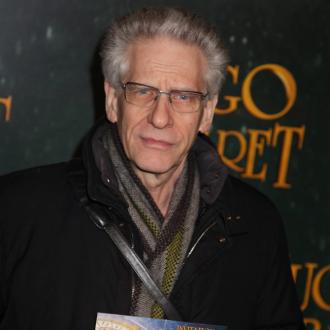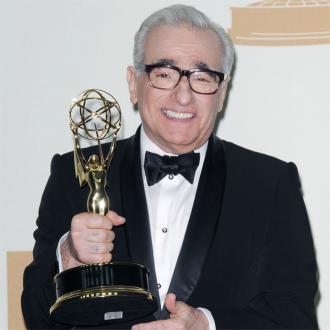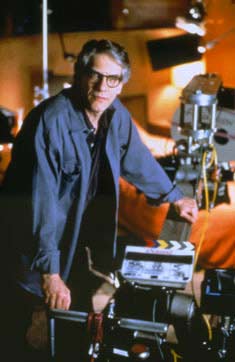
david cronenberg Interview
07 January 2009Controversial visionary David Cronenberg sees technology, mankind, sexuality merging in 'eXistenZ'
I don't know what I was expecting exactly when I met DavidCronenberg, arguably the most bizarre, eccentric and even grotesque auteurin North America.
A visionary and controversial director with a penchantfor ingenious, violent and sexual metaphors, he's been responsible fora half dozen of the most admired (by film aficionados) and abhorred (bymany others) movies of the last 20 year, including "Videodrome"(a violent and sexualized allegory on thought control) "The Fly"and "Dead Ringers" (considered the height of the art house-horrorhybrid), and hallucinogenic, autobiographical adaptation of William S.Burroughs' "Naked Lunch." In 1997 his adaptation of J.G. Ballard'snovel "Crash,"about car-crash fetishists, was shelved for several months by New LineCinema owner Ted Turner, who didn't want anything to do with the twistedtale.
Was I meeting a human deviant? A demented genius with "straightjacket" written all over him? I didn't know, but for the first timein years, I was feeling intimated about an interview.
Then I was lead into the conference room of San Francisco'sPrescott Hotel and shook hands with a congenial, bespectacled fellow withsalt-and-pepper hair and a benevolent smile. It turns out, David Cronenberg-- the envelope-pushing circus freak of independent cinema -- is a cheerful,deep-thinking, mild-mannered college professor type. Go figure that.
Today he's here to talk about "eXistenZ,"the first film since "Videodrome" that he both wrote and directed.A forward-looking, somewhat cautionary vision of the future of virtualreality, the film stars Jennifer Jason Leigh as the inventor of a bio-engineeredgame, played by plugging a living game pod directly into the central nervoussystem through a fleshy umbilical cord inserted into an orifice carvedin the player's back.
In the near future created for "eXistenZ," anyonewho hasn't been jacked with one of these bioports is considered a squarein most circles. It takes place in a world where the game and reality aredisturbingly intermingled. In Cronenberg's vision, technology and the humanorganism have begun to merge -- something the director considers inevitable.
"I see technology as being an extension of the humanbody," he says. "It's inevitable that it should come home toroost."
But before we discussed to his new movie, his fixationwith sexuality and the organic form, we talked about Hollywood and whyhe's fed up with being perceived as a horror director.
"I never thought I was doing the same thing as directorslike John Carpenter, George Romero, and sometimes even Hitchcock, eventhough I've been sometimes compared to those other guys. We're after differentgame," Cronenberg says. "The filmmaking process is a very personalone to me, I mean it really is a personal kind of communication. It's notas though its a study of fear or any of that stuff."
Contactmusic.com: Your films are more deeplypsychological, where many of those directors are often just trying to makeyou jump out of your seat.
David Cronenberg: True. Even Hitchcock liked tothink of himself as a puppeteer who was manipulating the strings of hisaudience and making them jump. He liked to think he had that kind of control.I don't think that kind of control is possible beyond a very obvious kindof physical twitch when something jumps out of the corner of a frame. Ialso think the relationship I have with my audience is a lot more complexthan what Hitchcock seemed to want his to be -- although I think he hadmore going on under the surface as well.
But you can't control all of that. Anybody who comes tothe cinema is bringing they're whole sexual history, their literary history,their movie literacy, their culture, their language, their religion, whateverthey've got. I can't possibly manipulate all of that, nor do I want to.I'm often surprised -- I expect to be surprised -- by my audience's reactionsto things.
Contactmusic.com: Do you consider any of your movieshorror movies?
Cronenberg: No. I don't. "The Fly" was,technically, a horror sci-fi film, and this is technically a sci-fi film.But to me that's not a creative category. That's a marketing problem orpossibly a critical problem, a journalistic preoccupation. But it doesn'tfunction on a creative level.
It doesn't mean anything. Each movie generates its ownlittle biosphere and has its only little ecology and its climate, and you'reattune to that more than anything else. So when people say "is thereanything you wouldn't show on film?" or "would you draw back?"I say, if I do it's only because of that biosphere. What is appropriate?What works within the ecology of that movie? So in one movie sex and bloodwould be very up front, like in "Crash" because it's sort ofthe subject of the movie. But in another movie, like "The Dead Zone,"it would not be appropriate. It would be disproportionate.
There's no sex really in "eXistenZ," except metaphorically.There was an opportunity to have sex scenes, and we were all willing todo that. But as the film evolved, we thought it would be wrong. It wouldtake away from the metaphorical sex, which is all this plugging in andthat sort of stuff. That's more interesting. It has more resonance thanif you suddenly saw a real, naked sex scene in the middle of all that.It would unbalance all that -- almost invalidate it. So if you wait, themovie gradually tells you what it wants to be, and you have to sort ofgo on with it.
Contactmusic.com: There seem to be connectionsbetween "Videodrome," which you also wrote and directed, and"eXistenZ." The way you're plugging in a pre-programmed videotapeor a game into your body. Was "Videodrome" on your mind?
Cronenberg: No. You have to remember I haven't seenit in 15 years. You might well have seen it more recently than I have.It is true this is the first script I've written since "Videodrome,"so I'm sure that connects somewhere. But when you're writing a script --for me anyway -- you have to sort of create an enforced innocence. Youhave to divest yourself of worrying about a lot of stuff like what moviesare hot, what movies are not hot, what the budget of this movie might be.You have to stop worrying about what people might expect from you becauseof the last thing you did...you have to stop worrying about your othermovies. I mean, I just know they're all going to be interconnected. Peoplehave asked me to do a sequel to "Scanners," or they've asked,very recently, to do a remake of "Shivers." And that would feellike a horrible place to put myself. I wouldn't want to go back there.
Contactmusic.com: Have you ever considered doinga big budget, schlocky studio film? Has anyone has pitched you anythinglike that?
Cronenberg: Oh, heavens yes! Recently? "The Truman Show" and "Aliens4," and in the early days things like "Witness"and "Top Gun." Oh, and "Flashdance." Dawn Steele, forsome reason, kept bugging me to do "Flashdance"! And I kept saying"No." and "You won't thank me! I would destroy this!"So, yes, I do get offered stuff. And, like, "Alien 4" is temptingfor a minute because they're begging me to do it, and I think to work withSigorney Weaver and Winona Ryder would be great fun, and so on.
Contactmusic.com:...and it has some of the samekinds of themes, body themes, that you often work with...
Cronenberg: Yeah, because the original "Alien"took stuff from "Shivers." It was obvious that happened. I knowhow it happened, too, but we won't get into that.
The problem with doing a schlocky or big budget studiofilm is that it wouldn't actually be fun for me. It wouldn't be exciting.My rule of thumb is this: You're six months into it, you've got six monthsto go. It's February. It's winter. It's dark. Am I suicidal, or am I reallyexcited and happy? And the answer with those projects would be, "I'msuicidal."
Contactmusic.com: You originally wrote "eXistenZ"three years ago. I imagine you had to make changes to update the technology,since such things change so rapidly.
Cronenberg: That didn't change. The technology Isort of side-step in this movie. It's the metaphor. It's the drama andthe meaning of it and all of that which is interesting to me.
We don't have any computers in this movie. It's a differenttechnology. I'm certainly aware that the big chip makers have all doneheavy, heavy research into using protein molecules as a basis of theirchips, and protein molecules are the basis of organic life. I read an articlerecently about experiments done to try to use DNA strands as electricalwiring.
Since I see technology as being an extension of the humanbody, it's inevitable that it should come home to roost. It just makessense. I mean, I literally show that in the movie with the pod pluggedinto central nervous system.
Technology is us. There is no separation. It's a pure expressionof human creative will. It doesn't exist anywhere else in the universe.I'm rather sure of that. But we'll see if the spaceships come. And if itis at times dangerous and threatening, it is because we have within ourselveswe have things within us that are dangerous, self-destructive and threatening,and this has expressed itself in various ways through out technology.
(Modern technology is) more than an interface. We ARE it.We've absorbed it into our bodies. Our bodies, I think, are bio-chemicallyso different from the bodies of people like 1,000 years ago that I don'teven think we could mate with them. I think we might even be, in otherwords, a different species, we're so different.
(This) technology, we absorb it, it weaves in and out ofus, so it's not really an interface in the same way people think abouta screen or a face. It's a lot more intimate than that.
Contactmusic.com: Is that why in many of your filmsthere's some type of orifice through which a person is connecting?
Cronenberg: Yeah. I mean, technology wants to bein our bodies, because it sort of came out of our bodies. In a crude way,that's what I'm thinking. It wants to come home and that is its home. Firstof all, in the obvious ways -- the eyes with binoculars, the ears withthe telephone -- technology had to be an advancement of powers we knewwe had. Then it gets more elaborate and more distant from us. More abstract.But it still all emanates from us. It's us.
Contactmusic.com: And it's a theme in almost allof your movies.
Cronenberg: It's more than a theme. To me it's kindof like a living presence, an understanding, that is behind all of themovies.
Contactmusic.com: How does the idea of the technologicalmeshing of man and machine, how does that connect to the reoccurring themeof sexuality?
Cronenberg: Well, I think, with "Crash"it was getting very focused on the idea that we are re-inventing sex. Weare at a major epoch in human history, which is that we don't need sexto recreate the race. You can have babies without sex. This is the firsttime in human history that has been true, and it means, for example, wecould do some extraordinary things.
It's becoming disconnected from what it was initially,just in the same way we've taken control of our evolution. We are no longersubject to the laws of survival of the fittest in the gross physical waythat Darwin articulated. Even though we're not quite aware of it, we don'tknow how to deal with it, we are messing around with our evolution at thegenetic level.
So, I think, in the same way, sex is up for grabs, forreinvention. There have always been elements of politics, fashion, pleasure,art, in sexuality. But now those things are, in a weird way, almost theprimary part of sexuality. So why not say, OK, how about some new sexualorgans? They don't have to reproduce. They don't have to do all that complexchromosome splitting and stuff that goes with real reproduction, so whynot have direct access to your nervous system and create new orifices thatdo god knows what?
In a way, you're seeing new sex, neo-sex, in this movie.Or do you even want to call it sex? It's obviously inducing some kind ofpleasure the way sex does, but what is it?
I think that is happening. You see a lot of body modification.In the same way, we've never accepted the environment as it was given tous, we've never accepted the human body, either. We've always been messingwith it to the full extent of whatever the technology at the time wouldallow us to do. But then there's also the other element of body modificationthat are not medical. It's social, it's political, it's sexual, it's cosmetic,it's fashion. Just what people will do now -- with scarring, tattooing,piercing and all that, and performance art as well -- it would have beenunthinkable, at least as mainstream as it is now, not very long ago.
Contactmusic.com: To what do you credit your fascinationwith organic form and the mutation of the human body?
Cronenberg: I got bored. That was traumatic.
I think it really has more to do with the perception andan understanding than the whole idea that it's something that happenedto you in your childhood. I'm just observing the world. I was born intoit, like you were, and then I found out there were some really disturbingaspects to being alive, like the fact that you weren't going to be aliveforever -- that bothered me.
Do you remember when you found out you wouldn't live forever?People don't talk about this, but everybody had to go through it becauseyou're not born with that knowledge. That's the basis of all existentialistthought, which, of course, is an underpinning of this movie. It's not called"eXistenZ" for nothing.
For me, the first fact of human existence is the humanbody. But if you embrace the reality of the human body, you embrace mortality,and that is a very difficult thing for anything to do because the self-consciousmind cannot imagine non-existence. It's impossible to do.
So not only can you not imagine dying, you can't reallyimagine existence before you were born. So, I think, for example, that'sone of the reasons people believe so strongly in reincarnation. They kindof assume that somehow they were there. You can't imagine things goingon without you. That's just the nature of our self-consciousness.
So I observed these kinds of things as a kid and then I'mgradually expressing this and talking to myself through my movies aboutall of this stuff. Then I'm really inviting the audience to have that conversationwith me. You're seeing me develop, not only as a filmmaker if you've seenmy earlier films, but you're seeing me kind of learn how to be a human,how my philosophy has evolved.
So that's why I think, for example, this movie cannot belike "Videodrome." All the other connections aside -- that waswhat, 17 years ago? -- I'm different now.
Contactmusic.com: So all of your movies togetherare like a biography.
Cronenberg: Well, they should be. They're almostlike chapters in an ongoing book.
Contactmusic
Top 10 Videos
Wallace Chung
XXX
1
10 Years
Beautiful
2
Fast Girls
Fast Girls
3
Shaggy
Hey Sexy Lady
4
Air
Sexy Boy
5
The Staves
Tired As F***
6
Robin Thicke
Blurred Lines (Unrated Version)
7
All That Remains
Six (Live)
8
Fugees
Boof Baf
9
Fleur East
Sax [Live]
10
Movies and Trailers
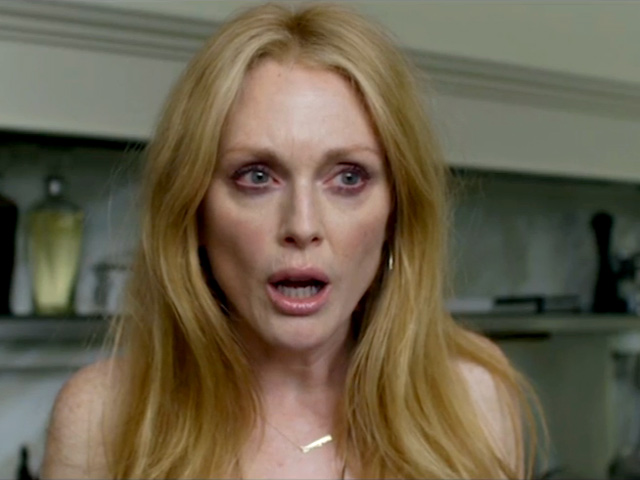
Maps To The Stars Trailer
Havana Segrand (Julianne Moore) is an actress struggling with her insecurities and desperate to reprise...

Cosmopolis Trailer
In a luxury stretched limousine on the way to get a haircut from his father's...
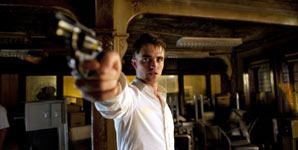
Cosmopolis Movie Review
Artful, intelligent and wilfully obtuse, Cronenberg uses his skill to hold our interest through this...

Cosmopolis Trailer
As he is transported in his lavish stretched limousine across Manhattan to get a haircut,...

A Dangerous Method Trailer
Set in Vienna before the start of World War One, Carl Jung, a student of...
Advertisement

Spider Movie Review
The strangest thing about David Cronenberg's Spider is how out of sync it is with...


